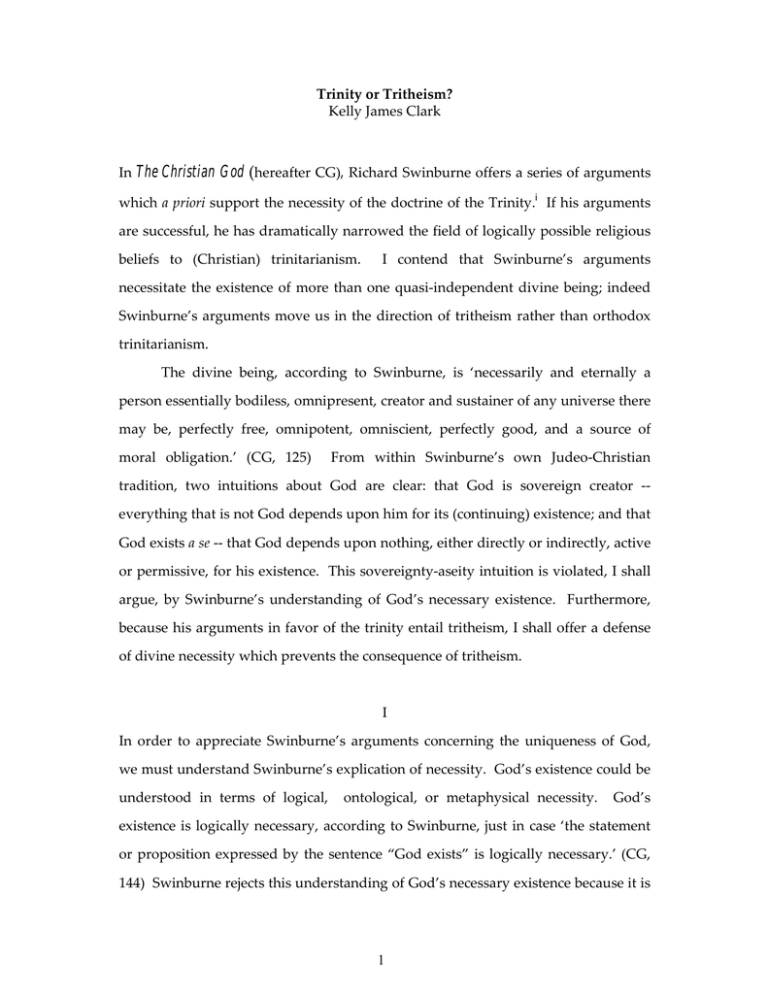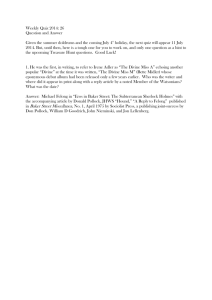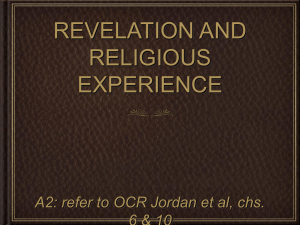The Christian God ,
advertisement

Trinity or Tritheism? Kelly James Clark In The Christian God (hereafter CG), Richard Swinburne offers a series of arguments which a priori support the necessity of the doctrine of the Trinity.i If his arguments are successful, he has dramatically narrowed the field of logically possible religious beliefs to (Christian) trinitarianism. I contend that Swinburne’s arguments necessitate the existence of more than one quasi-independent divine being; indeed Swinburne’s arguments move us in the direction of tritheism rather than orthodox trinitarianism. The divine being, according to Swinburne, is ‘necessarily and eternally a person essentially bodiless, omnipresent, creator and sustainer of any universe there may be, perfectly free, omnipotent, omniscient, perfectly good, and a source of moral obligation.’ (CG, 125) From within Swinburne’s own Judeo-Christian tradition, two intuitions about God are clear: that God is sovereign creator -everything that is not God depends upon him for its (continuing) existence; and that God exists a se -- that God depends upon nothing, either directly or indirectly, active or permissive, for his existence. This sovereignty-aseity intuition is violated, I shall argue, by Swinburne’s understanding of God’s necessary existence. Furthermore, because his arguments in favor of the trinity entail tritheism, I shall offer a defense of divine necessity which prevents the consequence of tritheism. I In order to appreciate Swinburne’s arguments concerning the uniqueness of God, we must understand Swinburne’s explication of necessity. God’s existence could be understood in terms of logical, ontological, or metaphysical necessity. God’s existence is logically necessary, according to Swinburne, just in case ‘the statement or proposition expressed by the sentence “God exists” is logically necessary.’ (CG, 144) Swinburne rejects this understanding of God’s necessary existence because it is 1 not self-contradictory to claim that a world without a particular substance or a particular kind of substance could exist. That is, the proposition ‘God does not exist’ is not incoherent. Since, so far as we know, the existence of a Godless universe is coherent, God’s existence is not logically necessary.ii The claim that a world without God is coherent is disputed by most thinkers in the Judeo-Christian tradition. Indeed historically this claim has been denied by virtually all philosophically reflective thinkers in this tradition. Aquinas, for example, contended that there can’t be being without Being and his famous second and third ways are attempts to demonstrate that if something exists then God must exist. God’s necessary existence is a presupposition of the existence of anything at all. Furthermore, if Plantinga’s, Anselm’s or others’ ontological arguments are sound then the existence of a Godless universe is not coherent. If “God exists” is a logically necessary truth then it is true in every possible word. And if true in every possible world, then there is no world in which the proposition “God does not exist” is true. Hence, the proposition “God does not exist” is incoherent. It may seem even to a theist that a coherent state of affairs could have been actual in which God does not exist. However if Anselm’s, et. Al.’s (pun intended) arguments are sound then what seems innocently enough to be possible is impossible. Occasionally our apparently obvious intuitions, arising as they are out of a well-formed tradition, about what is possible require education by complicated argument.iii Swinburne also rejects God’s existence as logically necessary because it would entail that His existence depends in some manner on a general logically necessary principle; one such principle is Anselm’s claim that it is more perfect to exist than not to exist. Such principles are not, however, logical principles; they are rather metaphysical or ontological principles having to do with degrees or types of beings. Even so Swinburne’s contention is still relevant: God’s existence would not be supreme if it depended upon some principle other than God. Swinburne here reifies a principle, asserts its independence from God, and alleges that philosophers such as 2 Plantinga and Anselm de facto make it the ground of God’s being. The metaphysical principles adduced in ontological arguments for God’s existence, however, needn’t exist independently of the divine nature. Rather, metaphysical principles may both be logically necessary and dependent upon God. This is part of the impetus behind Augustine’s locating the realm of Platonic Ideas within the divine mind. The Doctrine of Divine Ideas understands all truths, necessary as well as contingent, as dependent upon the creative powers of God. Hence, God’s existence may depend upon the truth of a necessary principle, but it is God Himself who creates that necessary truth; his existence would therefore not be dependent upon any truths independent of Himself.iv If it is possible for God to contain within Himself, so to speak, all metaphysical and ontological necessities, then He is totally self-dependent. This would undermine Swinburne’s charge that God, were His existence dependent upon a metaphysical principle, would be less than ultimate. If God is the source of metaphysical truths, then God contains within Himself the reason for His own existence. One also gains the conceptual advantage that at the bottom of the explanatory chain is a being that is self-explained rather than a sheer, brute existent.v A substance is ontologically necessary, according to Swinburne, “if there is no cause, either active or permissive, of its everlasting existence.” (CG, 146) An argument which Swinburne might have offered in favor of monotheism is based on the notion of ontological necessity: A divine individual who exists of ontological necessity would be such that there is no cause active or permissive of his existence at any time. But, if he is the creator and sustainer of any universe there may be, any other substance can only exist if he is, at least in part, the cause of its existence. Hence there cannot be, beside an ontologically necessary divine being, another such. (CG, 170) Swinburne’s position on this argument cannot be understood without introducing metaphysical necessity. A substance is metaphysically necessary “if either it is 3 ontologically necessary or its everlasting existence is caused (at least for some beginningless period) actively or permissively (directly or indirectly) inevitably in virtue of its properties by an uncaused and backwardly everlasting substance.” (CG, 146) Swinburne rejects the notion that God is ontologically necessary because ‘it does not follow from his possession of the other divine properties that he will be.’ (CG, 147) Ontological necessity is not entailed by omnipotence, perfect goodness, omniscience, freedom, etc. Thus, Swinburne contends, God’s existence is not ontologically necessary. It is difficult to see the force of this sort of argument: reject any property from the list of divine properties that is not entailed by the remaining properties on the list. Most believe that one cannot derive, say, omnipotence from perfect goodness, omniscience and freedom.vi Perhaps God is by nature underivably necessary (i.e., ontologically), just as He is by nature underivably omniscient. That God’s ontological necessity does not follow from his other divine attributes is no reason to reject it as part of his nature. If God is either logically or ontologically necessary, then there can be only one God. If God is logically necessary, then everything that is not himself depends upon God for its existence, while he depends upon nothing (except himself) for his existence. If God is ontologically necessary then there is no cause, either active or permissive, of his existence and by the doctrine of creation everything that is not himself depends upon him for its existence. So if God is logically necessary then he is also ontologically necessary. And if God is ontologically necessary then he is, by definition, metaphysically necessary. On this view, God is, so to speak, maximally necessary, a status rightly accorded to a supremely perfect being. If God is merely metaphysically necessary then there is a possibility that multiple gods exist. Swinburne thus considers the possible existence of two divine individuals, G1 and G2. Let us summarize: G1 is the active (and eternal) cause of G2 while G2 is the permissive cause of G1 and taken together, G1 and G2 are the active causes of all else. He elucidates: 4 So in this scenario there would be two metaphysically necessary substances, each with all the other divine properties, each omnipotent and so having the (compatibilist) power to annihilate the other but prevented by his goodness from choosing to do so. One would be the active cause of the other, and yet would only exist because the other everlastingly refrained from annihilating him, which he inevitably would refrain from doing. The everlasting existence of G2 would nevertheless belong to the essence of G2, because although it was dependent on the goodness of G1, G1’s goodness would itself be everlastingly dependent on G2. Although the essence of G2 involves ceding powers, they are powers which cannot be used against him. And the same holds for G1 mutatis mutandis. vii (CG, 147-8) What are the consequences of such a view for God’s aseity? On this view G2 is (everlastingly) actively dependent upon G1 and G1 is (everlastingly) permissively dependent on G2, although both could but won’t lose their existence to the powers of the other. Swinburne’s understanding of absolute omnipotence, in which both are constrained from annihilating the other simply by virtue of their goodness, seems insufficient for sustaining God’s aseity. On his view both gods depend upon the existence of the other (which existence they will never lose, of course, due to both beings also being constrained by perfect goodness). God’s logical or ontological necessity are superior for preserving this central doctrine of classical theism. Swinburne contends that it is more reasonable to accept the metaphysical necessity of divine existence because it is a simpler hypothesis than its alternatives. He contends that ontological necessity is a more complicated supposition because it is a relational property: ‘It adds to metaphysical necessity a relational element -- the element of being related to every other actual substance there may be by the relation of not being caused by it.’ (CG, 154) Since metaphysical necessity is, Swinburne contends, a monadic property, adding the relational element complicates the theistic 5 hypothesis. However ontological necessity may indeed be relational but also entailed by the monadic property of being pure, limitless, intentional power. But he believes such an inference is not guaranteed by the postulation of such properties. And since metaphysical necessity is simpler, it is to be preferred. What does reason require of us in this situation? Our intuitions concerning simplicity in these matters are not so clear as Swinburne alleges. Some see the postulation of a divine being with unlimited powers as excessively metaphysically extravagant.viii Swinburne’s intuitions with respect to simplicity in this context seem strained. While ontological necessity may not be guaranteed by pure, limitless, intentional power, those properties do suggest, hint at, support, or point to it. Furthermore, why deduce the divine nature from that set of properties? Recall that Swinburne’s own tradition also assumes sovereignty-aseity and perfect being intuitions. The simplest hypothesis which preserves these intuitions is that God’s existence is ontologically necessary. Additionally, we shall see that Swinburne’s views on this matter lead to the necessity of exactly three divine beings. Such a complicated hypothesis would be prevented at the outset by God’s logical or ontological necessity. These additional reasons converge on the simplest supposition -- God’s existence is logically or ontological necessary. And if ontologically necessary, then there is only one God. II Let us turn now to Swinburne’s discussion of monotheism. In Chapter 6 where he considers the notions of metaphysical and ontological necessity, he imagines the logical possibility of there being more than one God each of which is mutually and everlastingly dependent on the other for its existence. In this case they would both be metaphysically necessary but not ontologically necessary. If God is ontologically necessary, according to Swinburne’s definition, then there is no cause (presumably outside of himself) of his everlasting existence. Swinburne, of course, also believes that God is creator and sustainer of whatever universe there may be, that is God is 6 the continuous cause of everything that is outside of himself. If God is self-existent then there can’t be anything outside of him upon which he depends for His existence. And everything that is not God is dependent upon Him for its existence. Thus, there cannot be two ontologically necessary beings who are mutually interdependent for their existence. Can there be two metaphysically necessary divine beings which are mutually and everlastingly interdependent? Swinburne had defined God as being necessarily perfectly free, omniscient, omnipotent, and existing of metaphysical necessity. He contends that there is no problem with the existence of two beings that are necessarily perfectly free, omniscient and existing of metaphysical necessity. The problem arises with omnipotence. Can there be two metaphysically necessary, divine beings who are also omnipotent? Swinburne’s “gut reaction” is that a perfectly good, omnipotent being would be frustrated in his actions by a second perfectly good, omnipotent being; but he doesn’t follow his gut here. Swinburne believes that a being of perfect intellect and freedom will always be perfectly good. I shan’t rehearse his intriguing argument here.ix He concedes that in general the purposes of two divine beings would coincide and they would also, being constrained by perfect goodness, will not to frustrate the purposes of the other. Problems arise with the countless contingent, competing and equally good states of affairs that such beings might desire. It might be equally good for the sky to be green and grass blue. One might prefer Scotland and the other Palestine for the sending of the Messiah. There must be some mechanism, Swinburne contends, to prevent interference, which mechanism could not limit their powers. He believes that this mechanism could only be attained by each agreeing that it would be a bad thing to act in areas where the other is operative. And how might such an agreement to divide powers be drawn up? ‘Only if one lays down what the rules are, and his decision is accepted because he has the authority to lay down the rules, will the collision necessarily be avoided.’ (CG, 173) One divine being could be the ultimate authority only if there were a difference in 7 status. And a difference in status is not possible with two divine beings, unless one is more ultimate than the other. Furthermore, Swinburne contends that theistic arguments show that there can be only a single ultimate source of being. So, if there are two divine beings one must be the ultimate source of the being of the other and, hence, be afforded more authority than the other. Swinburne’s argument for the necessity of a hierarchy to avoid a collision of wills relies on an unduly anthropomorphic understanding of the relation between the two divine beings: But how are the lines of distribution of the proper exercise of power to be drawn up? By one divine individual? But there is nothing to guarantee that at the moment at which he draws up a proposal for distributing power, the other divine individual might not draw up a different proposal; and even with the best will in the world, only luck could prevent an actual collision of wills. (Compare the situation where two people are approaching each other along a pavement, and each tries to move to that side of the pavement where he guesses the other will not go; they may or may not collide.) Only if one lays down what the rules are, and his decision is accepted because he has the authority to lay down the rules, will the collision necessarily be avoided. (CG, 172-3) The problem is that Swinburne’s anthropomorphic description of the negotiations is misleading: One divine being makes a proposal and faxes it to the other who has all the while been developing his own proposal. Their faxes cross, negotiations falter, and wills collide. But Swinburne omits that both beings are omniscient and perfectly good. Both know what the other desires and deems contingently good. Since both beings are free, they do not, according to Swinburne, have knowledge of the other’s future, free actions. But G1 could be perfectly adapted to the actions of G2 by eternally willing the following: If G2 does a then G1 will do a*. 8 If G2 does b then G2 will do b*. If G2 does c then G1 will do c*. . . . And mutatis mutandis for G2. Both could, therefore, instantly adapt their actions to the actions of the other. Suppose further the two beings are guided by the utilitarian calculus (a fine moral theory for gods); they would always know the effect of their choices upon the other and will that which would maximize the happiness of the world in which both exist. They would know both what the other contingently desired and the effects of their own willings and be perfectly adapted to the willings of the other. In a world of gods, happiness would be necessarily maximized without omnipotence being compromised. Omniscience and omnipotence, not luck, would prevent a collision of wills. And neither divine would need to be an ultimate source of authority for any of the other divine beings.x This will prove problematic for Swinburne’s understanding of the trinity, as it militates against the necessity of a divine hierarchy of authority and dependence of Son to the Father and Holy Spirit to the Father and to the Son. If there are two divine beings, G1 and G2, according to Swinburne one must be the ultimate source of the other and must also prescribe the mechanism for avoiding the collision of wills. This mechanism might be a division of functions whereby one individual makes decisions on certain areas and the other supports him and vice versa. This unity of action would be secured by the individual with the ultimate source of authority vowing to avoid conflict in those areas which are the domain of the other and requesting the second to avoid conflicts in the areas allocated to the first being. The act of promising would create an obligation on the part of the first divine being. The “overall goodness of conformity to that request (not to conform would be not to conform to a reasonable request from the source of his being and power)” (CG, 174), would ensure conformity on the part of the other 9 perfectly good being. The only constraints upon their actions, therefore, would be their perfect goodness; hence their absolute power would not be limited. One final issue remains. Swinburne contends that there is overriding reason for the existence of exactly three divine beings. The supreme good of love demands both sharing with another but also cooperating with another to benefit a third party. Three divine beings would be able to perfectly satisfy the demands of love. G1 and G2 could cooperate to benefit G3, G1 and G3 to benefit G2, and G3 and G2 to benefit G1. G1, say, would the ultimate (eternal) source of G2 and G3 would be directly dependent upon both G1 and G2. In turn G1 would be permissively dependent upon G2 and G3 and G2 would be permissively dependent upon G3. This creates a hierarchy of divine beings which resolves the problem of conflict discussed earlier. If one of the beings is granted ultimate authority, say the Father, and another is second in command, say the Son, followed by an obedient third, say the Holy Spirit, then in principle conflict is not possible. But we are jumping ahead to Swinburne’s argument in support of the trinity. III The Nicene and Athanasian Creeds were the first formal conciliar statements of the doctrine of the trinity. They claimed that while there is only one God there are three divine persons each of whom is fully God. Swinburne raises the problem of coherence: “If ‘there is only one God’ meant ‘there is only one divine individual,’ then the doctrine of the Trinity would be manifestly self-contradictory.” (CG, 180) The early church councils must therefore have understood these claims in a different sense, Swinburne alleges, because they would not have embraced an obvious contradiction. The view they intended to exclude is stated by Swinburne as follows: “I suggest that they were denying that there were three independent divine beings, any of which could exist without the other; or which could act independently of each other.” (CG, 180) Swinburne understands the trinity as three, unique but 10 mutually interdependent divine individuals indivisibly united in purpose and the unified source of everything else that exists. Here is Swinburne’s account of the trinity: On the account which I have given, the three divine individuals taken together would form a collective source of the being of all other things; the members would be totally mutually dependent and jointly behind each other’s acts. This collective would be indivisible in its being for logical reasons--that is, the kind of being that it would be is such that each of its members is necessarily everlasting, and would not have existed unless it had brought about or been brought about by the others. The collective would also be indivisible in its causal action in the sense that each would back totally the causal action of the others. The collective would be causeless and so (in my sense), unlike its members, ontologically necessary, not dependent for its existence on anything outside itself. It is they, however, rather than it, who, to speak strictly, would have the divine properties of omnipotence, omniscience, etc....Similarly this very strong unity of the collective would make it, as well as its individual members, an appropriate object of worship. (CG, 180-181) From his arguments of the previous section, there must exist three unique divine individuals. The trinitarian claim that there is one God, therefore, is just the claim that the three divine beings are one in purpose and are mutually interdependent for their existence. For Swinburne the phrase “each individual is God” is simply the phrase “each individual has all of the divine properties.” No further identity claims are being made. Swinburne trades on a linguistic ambiguity in the Greek and Latin phrases ΘεóS and deus (which are normally translated “God”) of the original creeds. The terms could either be translated “a god”, referring to any being with divine properties, or “God”, as a title or proper name of the unique individual possessing the properties in the definite description of a supreme being. Swinburne notes that Latin lacks the definite article which would clearly restrict the phrase to the second 11 sense and although the Greek does have a definite article, it is sufficiently fuzzy that the less definite sense, ‘a god’, is not precluded. He concludes: “Given this ambiguity, it is not implausible to read the creeds as asserting that three divine individuals (in my sense) together constitute one God (in my sense)” (CG, 182) The remainder of the chapter is an intriguing defense of his interpretation of the Creeds but I believe the substance of his views have been faithfully expounded and we can profitably omit the remaining subtleties. III Swinburne eschews the charge of tritheism because of the mutual dependence and shared purposes of the three logically distinct, divine beings. Nonetheless he maintains that there are three non-identical divine individuals. In this section I shall discuss whether or not this is a plausible interpretation of the early church’s understanding of the doctrine of the trinity. The finest sources of the doctrine are the Nicene and Athanasian Creeds. In response to the theology of Arius the Christian church was forced to specify in what sense Jesus was related to God. Arius contended that Jesus was a mere creature, created by God with a beginning in time. The Nicene Creed denied these limitations asserting that in Jesus God had fully entered into human history. Let us consider portions of the Nicene Creed: ‘We believe in one God (ενα Θεον), the Father...And in one Lord Jesus Christ, the Son of God, begotten from the Father, only-begotten, that is, from the substance of the Father....And we believe in the Holy Spirit. But, as for those...who assert that the Son of is of a different hypostasis or substance--these the Catholic and apostolic Church anathematizes.’xi Its claim that Jesus is “Of one substance with the Father” was inserted late in the process and is the only non-scriptural clause in the Nicene Creed; its virtue is that it is unequivocal in its affirmation of the divinity of Jesus. Although the Holy Spirit receives scanty attention in this creed, the affirmations and denials about Jesus are clear. The Constantinople Creed, commonly but mistakenly referred to as the Nicene Creed in contemporary liturgies, 12 extends divine status to the Holy Spirit: “We believe...in the Holy Spirit, the Lord and life-giver, Who proceeds from the Father, Who is worshiped and glorified together with the Father and the Son.”xii God the Father and God the Son are comprised of the same substance. Anyone who asserts that Jesus is not wholly made of the divine substance is anathema. Being made out of divine substance, however, is not sufficient to establish any identity claims between Jesus and the Father any more than being made out of human stuff establishes an identity claim between Elvis Presley and Alvin Plantinga. So far Swinburne’s multi-theistic reading of the Nicene Creeds is not implausible. Let us consider portions of the Athanasian Creed: “We worship one God in Trinity, and Trinity in Unity; neither confounding the Persons, nor dividing the substance. For there is one Person of the Father, another of the Son, and another of the Holy Spirit. But the Godhead of the Father, of the son, and the Holy Spirit is all one....And yet there are not three Almighties, but one Almighty... Like as we are compelled by the Christian verity to acknowledge each Person by himself to be God and Lord; so we are forbidden by the Catholic religion to say that there are three gods or three Lords.... He therefore that will be saved must thus think of the Trinity.”xiii Swinburne rejects the traditional understanding of the Athanasian creed ‘that there are three divine things, and yet only one’ as logically contradictory. And again, anything that is evidently contradictory could not have been promulgated in a conciliar statement of this importance. Perhaps it is ambiguous whether or not there are one, two, or three divinities according to the Nicene and Athanasian Creed. Suppose we concede that the documents, taken as isolated texts, are ambiguous in the sense which Swinburne attributes to them and that tritheism is not an impossible reading of them (I find this considerably more difficult to do with the Athanasian creed). Is it, however, in its context a plausible reading of the creeds? Is tritheism an all-things-considered best understanding of the development of Christian doctrine? I believe that all things considered, Swinburne’s reading of these Creeds is implausible. 13 The Christian religion developed out of a backdrop of radical Hebrew monotheism. From the beginning the sacred Hebrew texts stood out from their Near Eastern contemporaries for their commitment to a single divine power. The Shema precluded belief in multiple deities: “Hear, Oh Israel, the Lord our God is One.” In so far as Jesus was maintaining the Hebrew tradition and the Jesus’s own monotheism constrained the development of doctrine, it is implausible to suppose that the early church intended to affirm the doctrine of tritheism. Indeed the doctrinal innovation of the early church was not the rejection of traditional monotheism but the affirmation of trinitarianism -- a single divine being who is three in one. The Nicene Creed itself begins by echoing the Shema: “We believe in one God...” The Athanasian creed affirms repeatedly “One God” and denies that there are three gods or three Lords. And yet this one God is three. Orthodox monotheistic, trinitarianism may be incoherent, as Swinburne alleges, but that is precisely what was affirmed by the ecumenical councils of the early Christian church and how it was understood by the Church for well over a millennium. The classical creeds affirm a unity of nature -- a single, divine being with three persons -not, as Swinburne alleges, a community united in purpose or will or interdependence. V In this essay I have argued that Swinburne’s a priori arguments necessitate tritheism as opposed to trinitarianism. I have also argued that his tritheistic understanding of the trinity is not a plausible reading of the Christian tradition which is committed, in its very roots, to Hebrew monotheism. God’s inexpressible name “Yahweh” is rendered “I am who am” and has been taken to capture the divine essence as eternally self-existent. Radical Hebrew monotheism is supported by the tradition’s commitments concerning the divine being -- that God is sovereign, exists a se and is a supremely perfect being: while everything depends upon God for its (continued) existence, God does not depend upon anything for his existence; a being is 14 supremely perfect if it possesses every great-making property. The simplest supposition that captures these commitments, and is therefore most likely to be true, is that God is logically and therefore ontologically necessary. God is a being, we learn from the cosmological and ontological arguments, whose essence is existence. A supremely perfect being exists in every possible world, hence it is not coherent to suppose a world in which God does not exist. So God’s logical necessity is the best understanding of perfect being theology. On the further supposition of Augustine’s Doctrine of Divine Ideas, God is not dependent upon a logical principle that is independent of himself. The sovereignty-aseity intuition is preserved. Moreover, metaphysical necessity, in Swinburne’s sense, allows for the possibility of a divine being’s existence to be at least permissively allowed by a second divine being. This is clearly a violation of the tradition’s sovereignty-aseity intuition. Any complications introduced by allegedly relational properties are minor compared to the violations of these intuitions and the further complication of three divine beings that follow from Swinburne’s a priori arguments that rely so heavily on simplicity claims. One might object that this discussion relies on intuitions that are excessively tradition-bound. The obvious and truthful response is that it is. But this raises problems for Swinburne’s simplicity judgments. Why, given the commitments of his tradition, should he rely so heavily both on a priori and on simplicity judgments? Simplicity is a rational, human principle which both directs and eases the quest for explanation. Experience presents us with phenomena which, to use Swinburne’s terms, cry out for explanation. In order to explain the phenomena we appeal to simpler, typically theoretical, entities which entail or make more likely the phenomena in question. These entities in turn, under the force of new experiences, may require the postulation of even more complex entities which nonetheless are the simplest to explain our recalcitrant experience. So we believe not only in the simple supposition of atoms, but we have subdivided these into protons, neutrons, and electrons, which have in turn given way to quarks, charms, joy, and which may lead 15 again to the further postulation of even more complicated theoretical entities. One ought not postulate physical and metaphysical entities beyond necessity and we are hereby cautioned by the principle of simplicity. But is reality, at bottom, simple? Is Occam’s razor a guide to the truth or is it merely a convenient, human imposition on experience? I don’t see any belief- independent way of settling this. A philosophical theologian in Swinburne’s own tradition, however, ought to be wary of her commitment to Occam’s razor. The reason is deeply tradition-bound. Although she does not have independent rational access to the truth of the matter, she believes she has warranted beliefs which constitute prima facie defeaters of Occam’s razor. She is part of a tradition which affirms that at bottom reality is not unitary but is triune. She does not arrive at this conviction by a priori metaphysical speculation. Rather she is born or inducted into an authoritative tradition which is warranted independent of her belief in the trinity. Her Christological beliefs, for example, upon reflection seem best explained by the doctrine of the trinity. Her access to reality which is at bottom complex is based upon both revelation and faith inspired and divinely protected tradition. Merely human speculation, her tradition confesses, is insufficient for grasping this reality. She gains metaphysical information from the outside, so to speak, by the vehicle of revelation. My point is not here to defend the warranted beliefs of the Christian philosophical theologian; rather I only intend to demonstrate that Swinburne’s own tradition, on the very issue of the trinity, offers prima facie defeaters of the principle of simplicity. Simplicity, according to this tradition and on this matter, is not a reliable guide to the truth. Let me make one final comment concerning a priori judgments about God. As mentioned in a previous section, simplicity arguments are prima facie considerations the conclusions of which may need to be revised under the weight of either metaphysical arguments or experience. I have argued that metaphysical considerations and simplicity itself favor monotheism and, hence, rejection of Swinburne’s tritheistic views. Furthermore I have raised concerns about the very 16 principle of simplicity itself which has guided the discussion. But this very discussion betrays a commitment to trans-cultural reason which is capable of grasping a priori divine truths unsullied by historical-cultural verities. Is reason sufficiently powerful, sufficiently unhinged from the contingencies of my or my community’s collective experience, to be a reliable guide to the truth? Put the issue another way: Would a Buddhist, Hindu or Moslem philosopher be irrational in affirming that either God is one, or more than three, or that the category of number does not apply to God? I suspect not. Are J. L. Mackie, Antony Kenny or John Hick any more likely to make judgments that aren’t biased by the Judeo-Christian tradition? Even those thinkers who have distanced themselves from this tradition rely on claims and ideas which have been gleaned from that very tradition which they reject. Nietzsche warned that while secular, Enlightenment thinkers are openly hostile to biblical religion, they retain a faith which preserves deeply Christian values. Consider his cryptic remark: “How we, too, are still pious.”xiv How can discussion of these issues, or of ethics say or political theory, be carried on independent of a tradition which spawned the very intuitions to which it must appeal? I don’t propose to address these important but complex issues, but I believe they summon us to epistemological humility. I am not sanguine about my or Swinburne’s cognitive abilities to a priori grasp the truth of the Trinity. The best we can do is start with the judgments of our contingent community, be open to opposing arguments both from within and outside the community, and employ our cognitive faculties to refine our judgments as best we can. That is all that can be expected of us in our judgments concerning God (and, I believe, ethics, politics and maybe even science).xv Let me conclude with my considered, humble judgments, conceding my historical-cultural limitations, concerning monotheism. Perfect being theology and our sovereignty-aseity intuitions militate against Swinburne’s tritheism and in favor of radical monotheism. Whether or not the creeds are the best explanation of the 17 Biblical data, and whether or not it is logically possible to pull the trinity out of the hat of monotheism, are separate matters entirely.xvi NOTES i Richard Swinburne, The Christian God, (Oxford: Clarendon press, 1994). He also defends virtually the same position in “Could there be more than one God?” Faith and Philosophy 5, July 1988, 225241. ii For a defense of God’s existence as logically necessary see Alvin Plantinga, (Grand Rapids, MI: Eerdmans, 1974). God, Freedom and Evil iii A consequence of this is that God’s existence vastly constrains what sorts of worlds are possible. For example, his goodness constrains certain kinds of evils. Presumably some evils simply are not possible given God’s goodness. This is the flaw in Theodore Guleserian’s “God and Possible Worlds: The Modal Problem of Evil” Nous 17, May 1983, 221-238. See the response by Laura Garcia, “A Response to the Modal Problem of Evil” Faith and Philosophy 1, October 1984, 378-388. iv It is beyond the scope of this paper to discuss further the relation of necessary truths to the divine mind. For further discussion see, Christopher Menzel and Thomas Morris “Absolute Creation” in Thomas Morris, Anselmian Explorations (Notre Dame: University of Notre Dame Press, 1987), 161178. v This undermines facile criticisms of the cosmological argument which allege that answers to the question, “Why does God exist” is that He just does. He is a simple, unexplained, brute existence. At the bottom of explanation on this view is an unexplained explainer. If God’s necessary existence is logical then God’s existence is not without reason, hence it too is explained. But it is not explained, according to the doctrine of divine ideas, by something outside of God himself. See Kelly James Clark, Return to Reason (Grand Rapids: Eerdmans, 1990), 15-26. vi The limitation may be epistemic rather than logical. If the doctrine of divine simplicity is true then there is an essential identity among all of the divine attributes. From a human perspective, however, it will no doubt prove difficult to see that identity. In CG, Ch. 7, Swinburne attempts to derive all of the other divine attributes from God’s being pure, limitless, intentional power. I leave judgments of the success of this enterprise aside. vii If, per impossible, we were able to separate out the divine properties, omnipotence in the compatibilist sense would just be the power to do anything that is logically possible. But God is perfectly good by nature, hence, although he could do everything that is logically possible, there are many things he would not choose to do. God’s actions are constrained, therefore, by his goodness. So a being is omnipotent in the absolute sense if a being can do everything that is permitted by his nature. viii See J. L. Mackie, The Miracle of Theism (Oxford: Clarendon Press, 198X), . Swinburne has responded to Mackie’s arguments in “Mackie, Induction and God” Religious Studies, 19, Spring 1983, 385-392. ix See CG, 171. See also CG 134-6. 18 x Such a meeting of divine minds might elicit a variety of states of affairs. Since the choice to create a world or not is radically free, on being might create a world and the other not. Both might agree to create a single word and also agree to a division of labors over contingent goods which would entail harmony between their wills. And each might create his own universe, thereby eliminating the possibility of competing, contingent goods. But it does not seem unreasonable to suppose, contra Swinburne, that two divine beings could divide up non-necessary goods in ways that permitted the maximal expression of their creatively free omnipotence. The only constraints upon omnipotence, therefore, will be divine goodness. Divine being A may have the ability to make the sky green but not exercise that ability because it has been agreed that divine being B was in charge of the color of the sky. All constraints upon omnipotence, on this view, are characterological. In a sense the ability to will hasn’t been compromised, but the desire to will has been accommodated to the wishes of the other divine being. xi As found in J. N. D. Kelly, 216. xii Early Christian Creeds Third Edition (London: Longman, 1960, 1972) 215- As found in John Leith, ed. Creeds of the Churches (Oxford: Basil Blackwell, 1963, rev. 1973). p. 33. xiii As quoted in CG, 186. xiv Friedrich Nietzsche, The Gay Science, translated by Walter Kaufman (New York: Vintage Books, 1974), Part V (the later addition to the text), paragraph 344. xv Whether or not it even makes sense to say that we are approaching the truth is an entirely different matter. For an interesting discussion of the range of views on this matter, see Richard Rorty, “Is Truth a Goal of Inquiry? Davidson vs. Wright” in The Philosophical Quarterly, Vol. 45, No. 180, July 1995, 281-300. xvi See, for example, the Peter van Inwagen, ‘And yet there are not Three Gods but One God’, in Thomas Morris (ed.), Philosophy and the Christian Faith (Notre Dame, Ind.: University of Notre Dame Press, 1988), 241-78. 19







